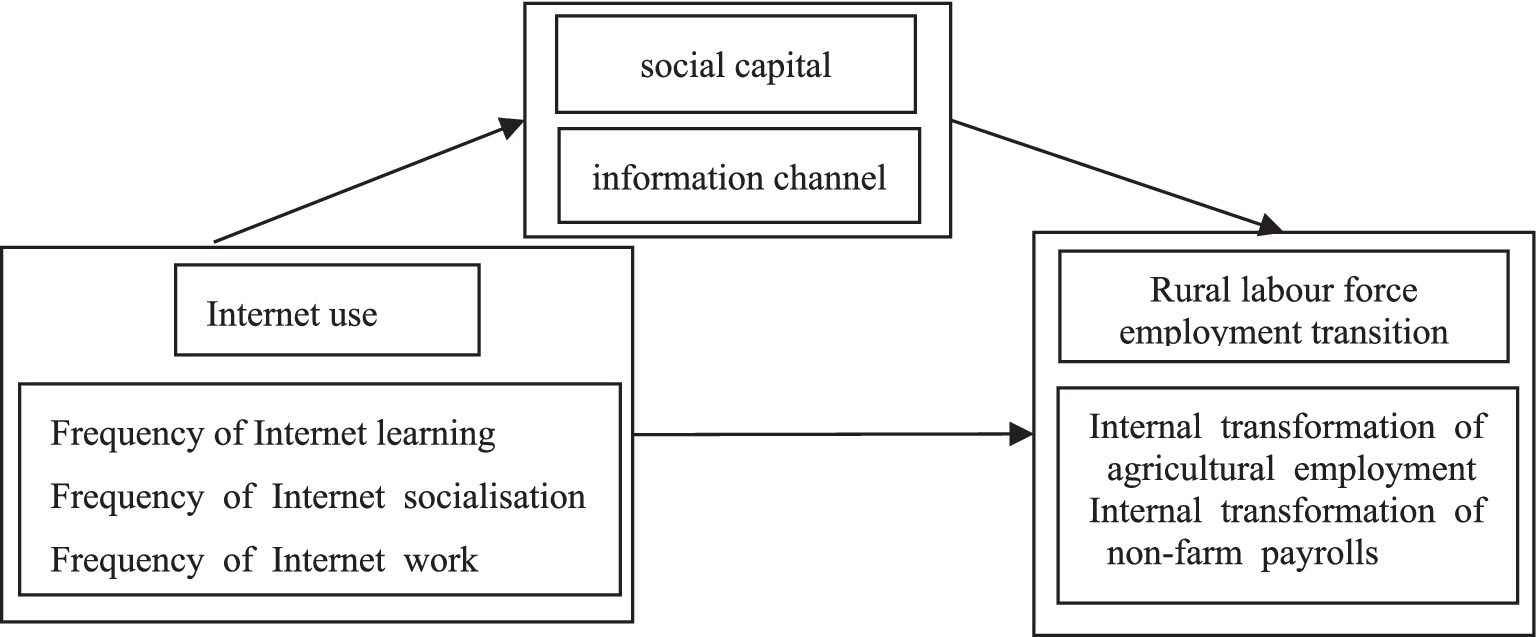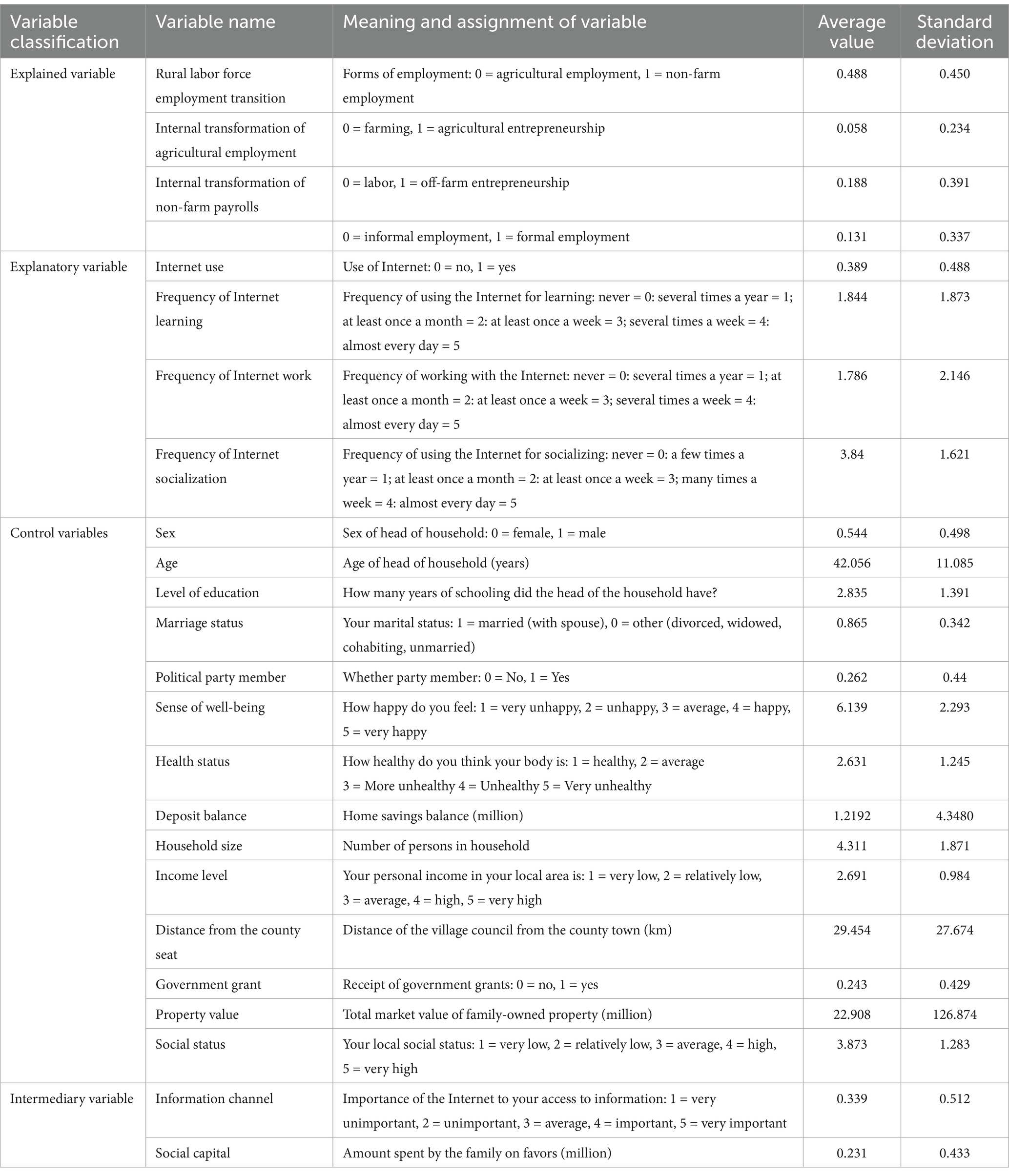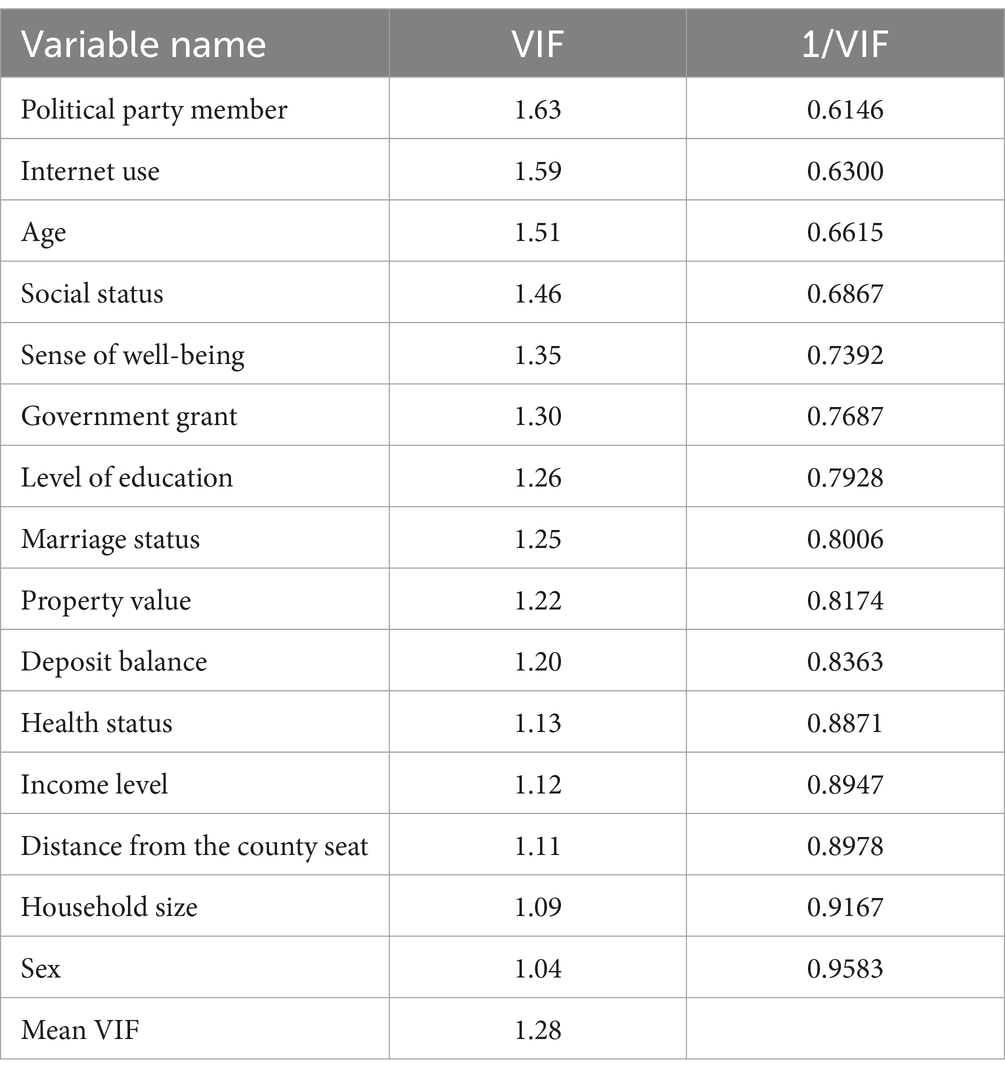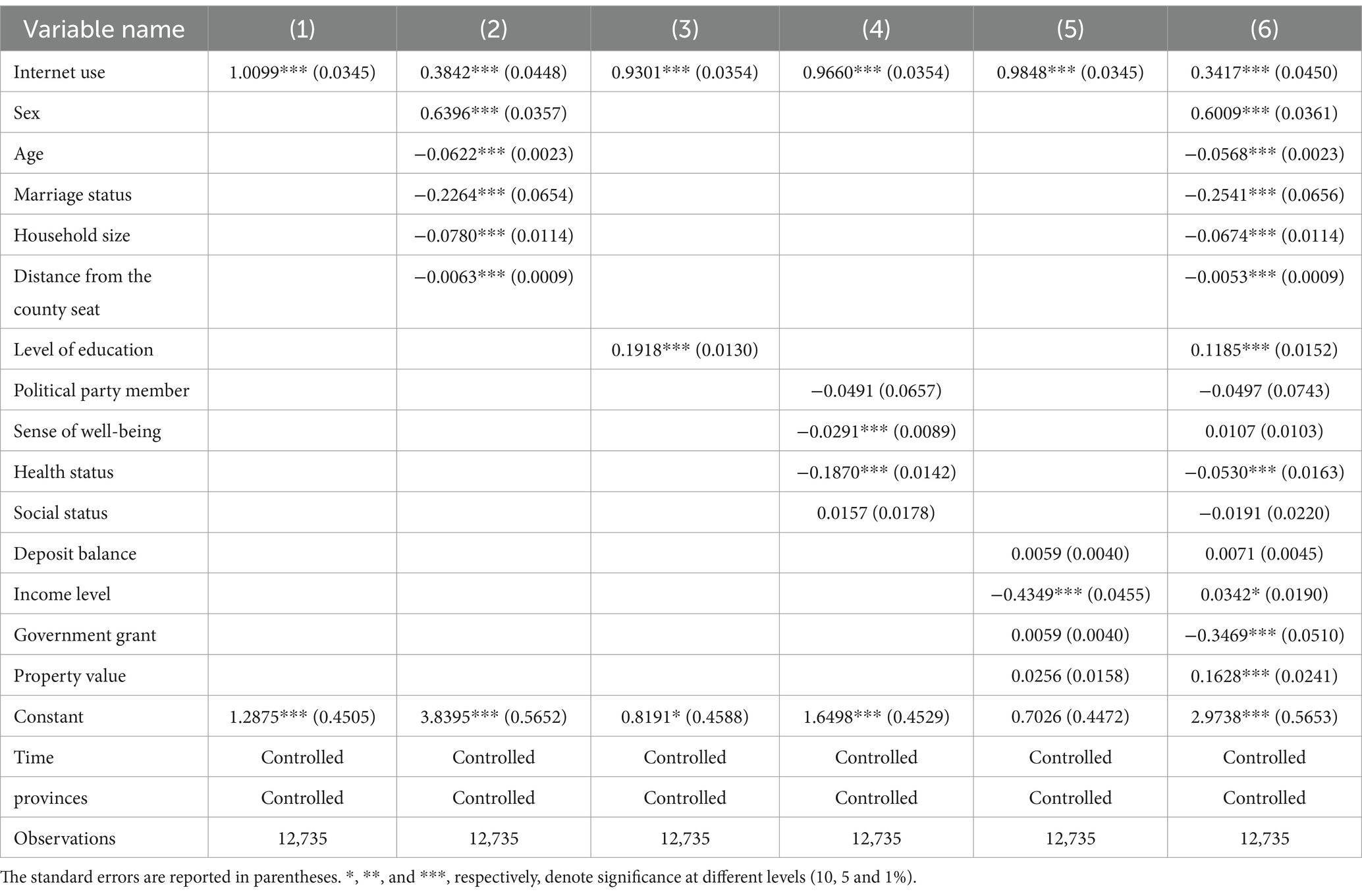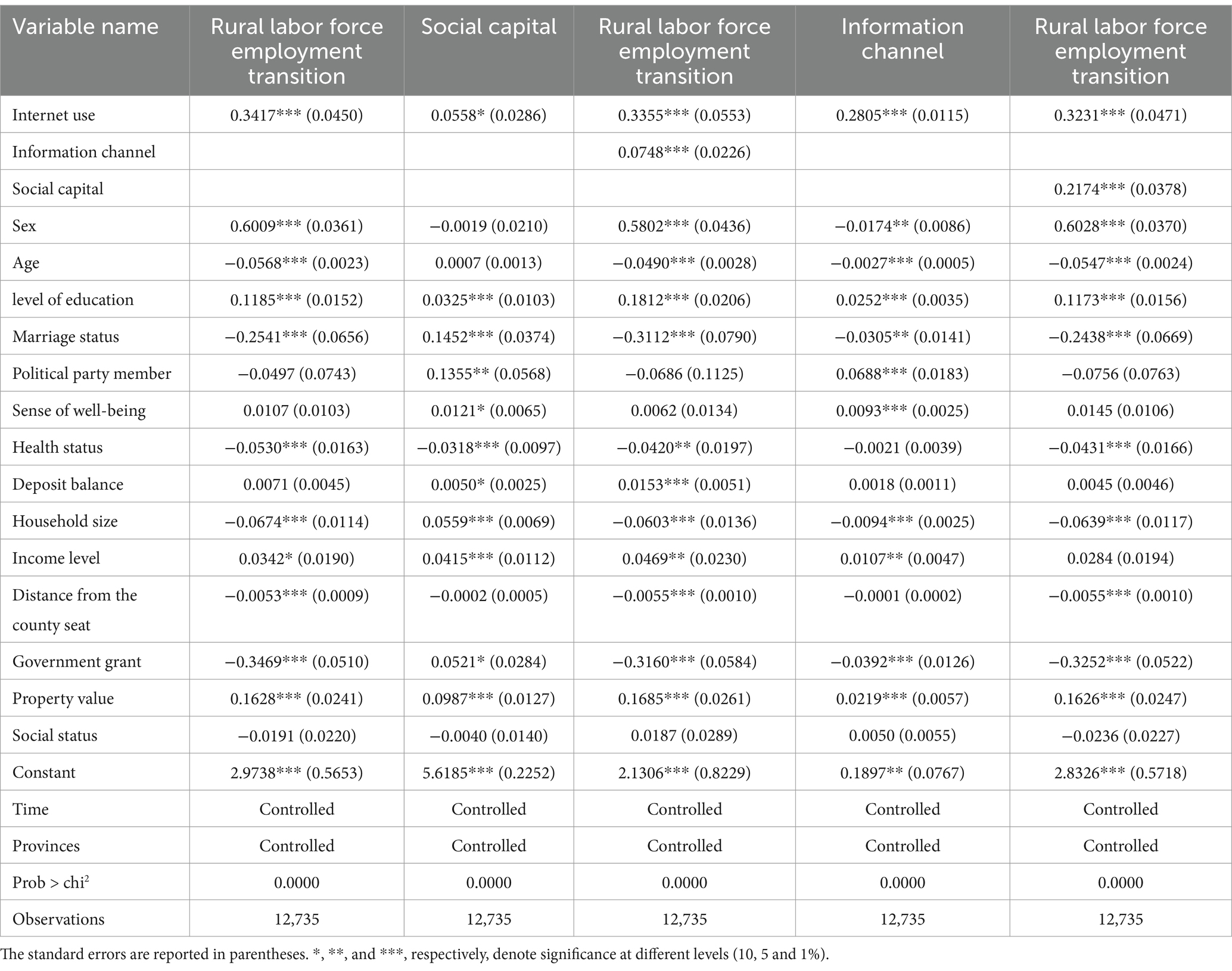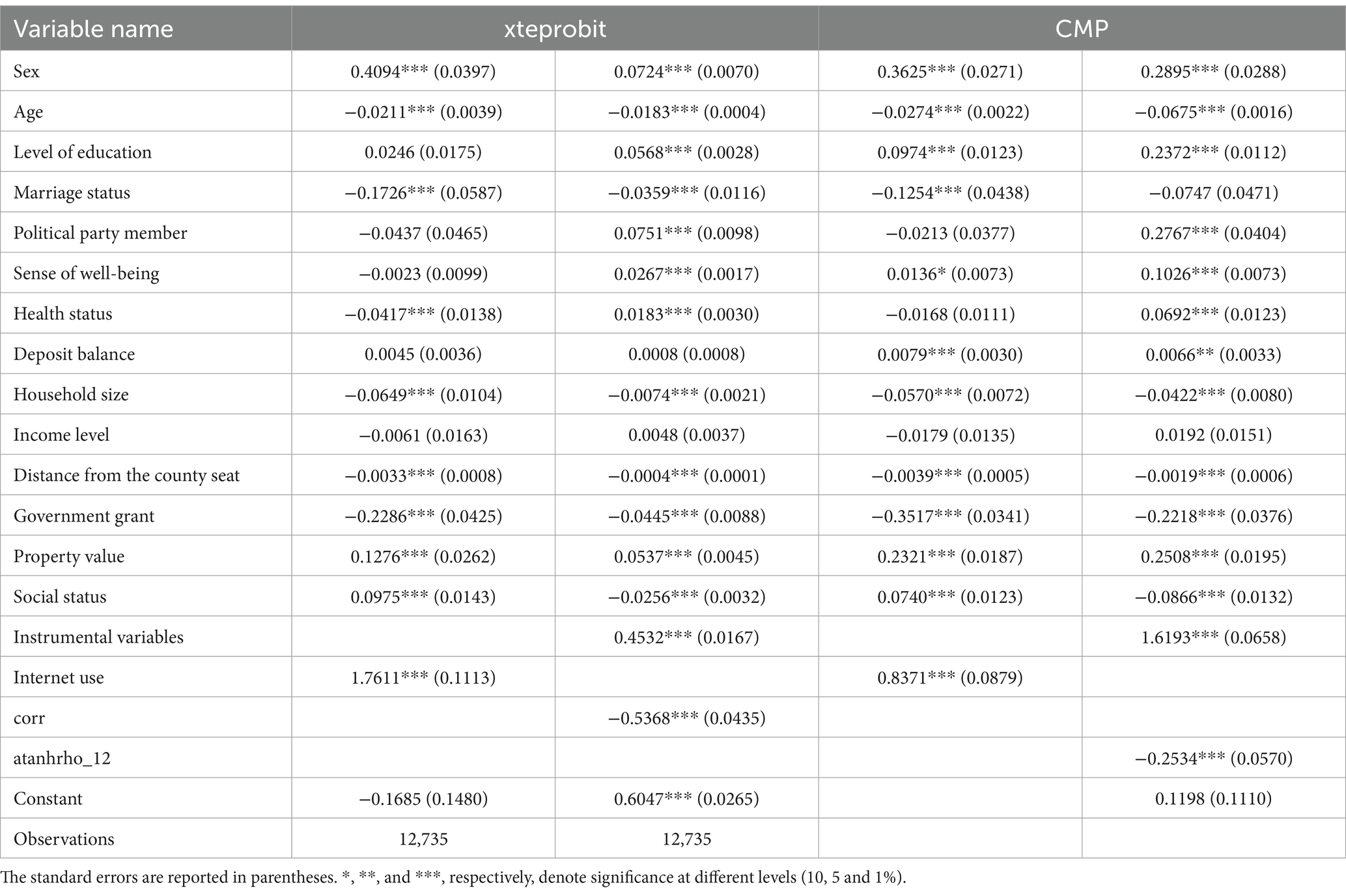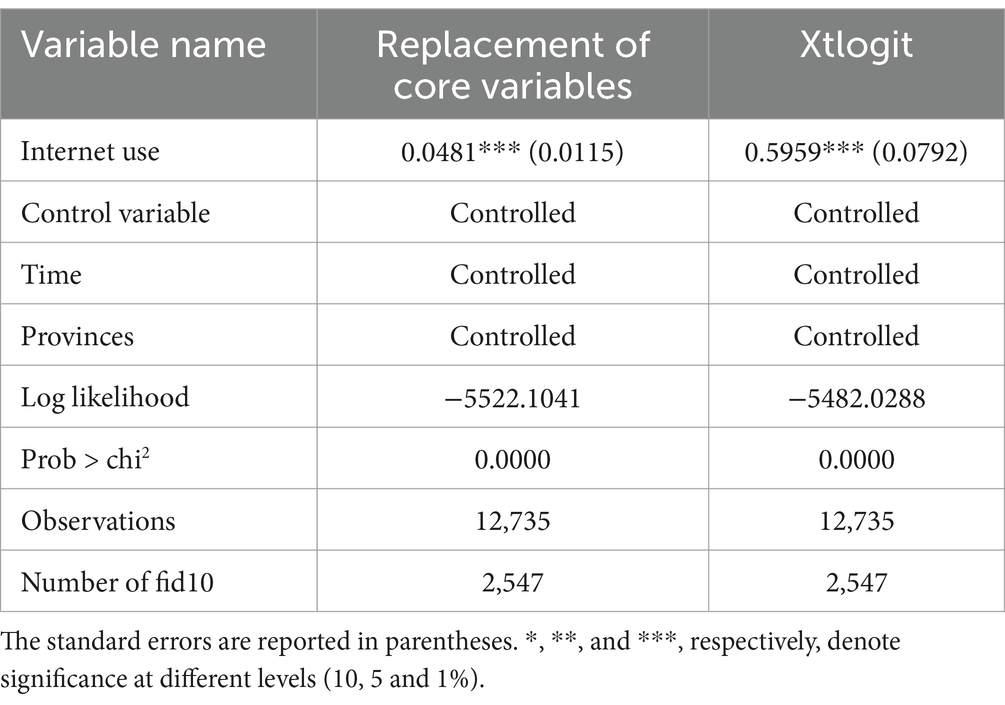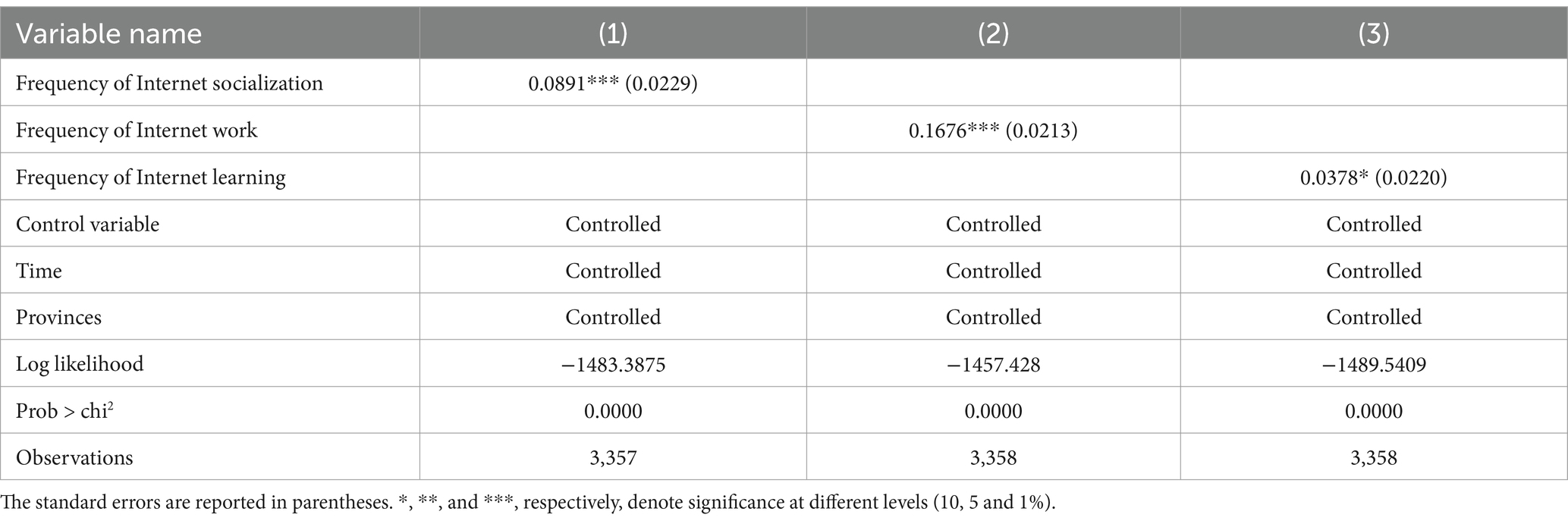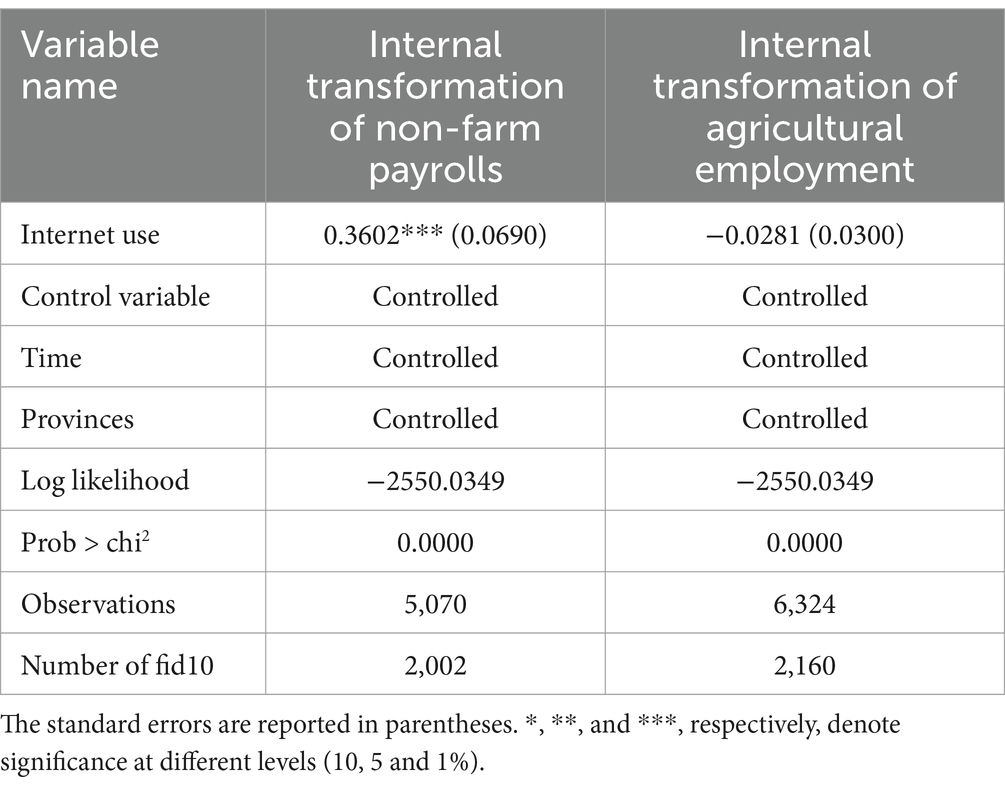- 1School of Economics, Management and Law, Jiangxi Normal University of Science and Technology, Nanchang, China
- 2School of Economics and Management, Jiangxi Agricultural University, Nanchang, China
Introduction: Amid the rapid development of the digital economy, the digital economy centered on Internet technology is reshaping the employment structure, particularly exerting significant influences on rural economic transformation and the upgrading of employment.
Methods: This paper empirically analyzes the impact of Internet usage on the employment transition of the rural labor force by employing the 2010–2020 China Family Tracking Survey panel data (CFPS).
Results and discussion: Studies show that the use of the Internet has a significant positive effect on the employment transformation of rural labor force and helps promote the transformation of rural labor force from agricultural employment to non-agricultural employment. The mechanism analysis discovers that Internet usage further affects the employment transition of the rural labor force by influencing social capital and information channels. The heterogeneity analysis indicates that different types of Internet usage have positive effects on the employment transition of the rural labor force, and Internet usage has positive effects on the employment transition of the “middle-aged generation,” “new generation” and “high-skilled” rural labor force. Simultaneously, Internet usage has a more pronounced effect on the employment transition of the “middle-aged generation,” “new generation” and “highly skilled” rural labor force. The expanded analyses demonstrate that the use of the Internet facilitates the deepening of the internal transition of the labor force from informal to formal employment, and also promotes engagement in manufacturing, transportation, wholesale, education and catering, while inhibiting agriculture, forestry, animal husbandry and fishery, and the construction industry. Based on the above findings, this paper proposes corresponding policy recommendations for promoting the construction of digital villages and enhancing the employment of the rural labor force.
1 Introduction
Facing the current severe international economic situation, accelerating the transformation of the economic development mode and promoting technological innovation in production are of great significance for increasing farmers’ income and narrowing the income gap between urban and rural areas. In recent years, the rapid development of Internet technology has brought profound changes to social life, played a crucial role in economic development, and also had an important impact on the employment of rural labor force (Frey and Osborne, 2017); Niebel, 2018; Yang et al., 2022. According to the “51st Statistical Report on the Development of China’s Internet,” as of December 2022, the number of Internet users in China reached 1.067 billion, with an Internet penetration rate of 75.6%. Among them, the number of mobile Internet users was 1.065 billion, and the proportion of Internet users accessing the Internet via mobile phones was as high as 99.8%. It is worth noting that the number of rural Internet users in our country has reached 308 million, accounting for 28.9% of the total number of Internet users. While the country is vigorously developing information infrastructure construction, it particularly attaches great importance to the coverage of information networks in rural areas. The “Rural Revitalization Strategy Plan (2018–2022)” clearly states that it is necessary to deepen telecommunications services and accelerate the coverage of broadband networks and fourth-generation mobile communication networks in rural areas. The expansion of the coverage of Internet infrastructure and the development of Internet technology have not only enriched the lifestyles of rural residents, but also changed their traditional agricultural production methods to a certain extent (Aker and Ksoll, 2016), injecting new impetus into agricultural modernization.
With the continuous penetration of Internet technology, “traditional villages” are gradually being incorporated into the development track of “modern cities,” promoting the sharing process of “digital dividends.” The Internet economy not only optimizes the employment environment and promotes the development of small and medium-sized enterprises, but also creates a large number of job positions, generating the so-called “dandelion effect” (Wang et al., 2020), providing more possibilities for migrant workers to achieve high-quality employment (Mandelman and Zlate, 2022). Under the embedding of the Internet economy, rural labor force not only uses the Internet as an information search tool to broaden the channels for obtaining employment information and reduce the cost of job search, but also conducts skills learning with the help of digital platforms to enhance their own human capital reserves and form “digital human capital” in a certain sense. Thereby enhancing its competitiveness in the labor market (Bach et al., 2013). These changes not only affect non-agricultural employment, but also bring new opportunities for the upgrading of the employment structure in the agricultural sector.
The transformation of the employment structure is an important manifestation and supporting force of the economic structure transformation. The development of the Internet may play an important role in promoting the employment transformation of rural labor force, and thereby driving the transformation of the economic structure and the growth of farmers’ income. With the prosperous development of the Internet economy, the rural labor factor market has also changed accordingly. When the marginal benefit of engaging in agricultural production is less than that of engaging in non-agricultural work, rational farmers tend to transfer out of agricultural land and transfer labor to non-agricultural industries while collecting rent (Zanello and Srinivasan, 2014; Zhu et al., 2021), gradually complete the structural transformation of the transfer of agricultural labor force to non-agricultural industries (Zhang et al., 2018), and promote the transformation process of rural labor force employment. However, during this process, some rural laborers did not merely stop at the level of shifting from agriculture to non-agricultural employment, but further sought transformation and upgrading paths within agriculture. For instance, some laborers who were originally engaged in traditional farming have begun to attempt agricultural entrepreneurship, expanding the agricultural value chain and increasing the added value of agriculture by developing characteristic agriculture, e-commerce of agricultural products, rural tourism and other means (Cao et al., 2013). This trend of transformation from labor-intensive to self-operated indicates that the employment structure within agriculture is undergoing profound adjustments. Furthermore, some rural laborers, after entering the non-agricultural sector, are no longer limited to the traditional form of employment. Instead, they choose to start businesses and participate in non-agricultural private operations, further enriching the employment forms for rural laborers to participate in the non-agricultural market and providing new impetus for agriculture and the non-agricultural labor market (Kushalakshi and Raghurama, 2014).
Therefore, against the backdrop of the continuous advancement of digital rural construction and the rural revitalization strategy, this article focuses on the employment mobility of rural labor force in the agricultural sector, with particular attention paid to their transformation paths from traditional farming to agricultural entrepreneurship and non-agricultural employment. An in-depth exploration of whether the use of the Internet has promoted the transfer of agricultural labor force to non-agricultural sectors? Has it promoted the upgrading of the mode of employment within agriculture from traditional farming to entrepreneurial agriculture? Is there any heterogeneous influence? The discussion on these issues is not only conducive to enriching the research content of digital rural construction, but also has important theoretical value and practical significance for promoting the transformation and upgrading of the rural economy, promoting rural revitalization and common prosperity.
2 Theoretical analysis
2.1 Direct impact of Internet use on the employment transition of the rural labor force
Currently, China’s economy is transitioning from a stage of high-speed development to one of high-quality development. This shift has led to increasingly intense competition in the labor market, particularly with regard to the employment of the rural labor force, which is encountering greater pressure and challenges. The 2011–2021 Migrant Workers Monitoring Survey Report indicates that although the scale of migrant workers has been expanding year on year, the growth rate has declined from 4.4 to 2.4%. In 2020, the sudden outbreak of the novel coronavirus pandemic severely impacted the urban and rural job market, and the employment situation of rural laborers became even more critical (Nushrat Jahan and Zhou, 2023). Employment constitutes the foundation of people’s livelihood. Achieving the employment transition of rural labor is an inherent requirement for China’s economy to shift from high-speed growth to high-quality development and an important means to address the current structural employment contradictions. With the rapid advancement of the digital economy, the promotion and application of digital technology, primarily the popularization of the Internet, have had a comprehensive and profound influence on human production, life, and ecology. New economic and business forms such as the platform economy have developed rapidly (Fernandes et al., 2018). The development of Internet technology has not only given rise to the rapid emergence of new employment forms but also exerted a significant impact on people’s lifestyles, interpersonal communication, and the establishment and maintenance of other social networks.
Internet usage has a considerable influence on the transformation of rural labor from agricultural to non-agricultural employment. With the extensive popularity and application of Internet technology, rural laborers have access to more information and resources (Kuhn and Skuterud, 2004; Deichmann et al., 2016), significantly broadening their horizons and altering the traditional concept of employment. The Internet not only offers a convenient means for rural laborers to obtain market trends and job information regarding non-farm employment but, more importantly, eliminates geographical constraints, allowing rural laborers to access a broader range of employment opportunities (Zou and Mishra, 2022). Through online recruitment platforms, social networks, and vocational training websites, rural laborers can more readily understand job requirements in other regions while also upgrading and matching their vocational skills to their own circumstances. This cross-regional and cross-industry information flow significantly stimulates the transfer of rural labor to non-agricultural sectors (Jing and Pundarik, 2022). Additionally, the Internet has given rise to numerous new industries, such as e-commerce and network services, providing new career development directions for rural laborers (Pan et al., 2022). Therefore, Internet usage is a crucial factor in facilitating the transition of rural laborers from agricultural to non-agricultural employment. It opens up new employment prospects for rural laborers by providing information, resources, and opportunities, and promotes the career development of rural laborers and the improvement of their living standards (Chen et al., 2022).
2.2 Mechanisms of the impact of Internet use on the employment transition of the rural labor force
The mechanism through which Internet use influences the employment transition of rural labor is mainly manifested in two aspects: social capital and information channels. Firstly, at the social capital level, the utilization of the Internet significantly facilitates the expansion of rural laborers’ social networks, allowing them to transcend geographical boundaries and connect with a broader range of individuals, thereby accumulating valuable networking resources (Yuan et al., 2021). This enrichment of social capital not only offers rural laborers more employment opportunities but also enhances their competitiveness in the job market. Through the Internet platform, rural laborers can communicate with potential employers, industry professionals, and their peers effortlessly. Such interaction not only assists in obtaining more career-related information and advice but also improves career skills and industry knowledge to a certain extent. The issue of rural labor employment can be regarded as the problem of “search” and “matching” in the job market. If there were no information asymmetry in the job market, the employment matching of the rural labor force could be automatically optimized. However, in reality, the job market frequently encounters problems such as information asymmetry, which leads to a deficiency of information. Nevertheless, in the actual job market, information asymmetry problems often exist, resulting in substantial costs for both parties in the search process (Stigler, 1961), and it becomes extremely challenging to find a suitable job. The characteristics of the rural labor force exacerbate the information asymmetry in the job market even further. The social network of rural laborers is narrower than that of urban residents, while the restriction of household registration status also reduces the number of jobs available to the rural labor force. Although the discriminatory status of rural laborers in the job market has improved significantly through the reform of the household registration system in various regions, there is still scope for further enhancement. The limited quantity of jobs and the scarcity of employment information make it challenging for rural laborers to secure suitable employment opportunities (Fomba et al., 2022). For a considerable period of time, rural laborers have relied heavily on social connections such as relatives and friends to obtain jobs (Bian and Huang, 2015). This method of information transfer based on the traits of the rural “acquaintance society” reduces transaction costs in job hunting, but simultaneously determines the inefficiency of information transfer in the job market.
Secondly, with regard to information channels, the utilization of the Internet has significantly broadened the information channels accessible to rural laborers in their job search and enhanced the efficiency of information transmission. The Internet offers a vast amount of recruitment information, and the advent of various professional job-seeking websites has further reduced the cost of matching between employers and employees. Information communication that was originally conducted offline can now be carried out online through more convenient and quicker means such as WeChat software. Additionally, it is worth noting that although the current role of the Internet is mainly reflected in the increase of information mobility, it can be anticipated that, along with the development of the Internet, technologies based on big data and various algorithms will be increasingly employed in the employment scenarios of the rural labor force, thereby effectively alleviating the problem of information asymmetry in the rural employment market and improving the efficiency of rural laborers in job seeking (Beard et al., 2012). Internet usage can have an influence on jobs in the labor market, particularly on the impact and reconstruction of jobs in the economic system. The development of the Internet has not only generated a large number of job opportunities but also continuously reshaped the employment mode of the labor force, making the previously more centralized and standardized patterns of labor organization less rigid and more flexible (Bloom et al., 2016). The alterations in labor organization patterns brought about by the Internet will also facilitate an increase in the level of rural labor force employment, and new forms of employment represented by online platform-based employment keep emerging, absorbing a considerable number of employed individuals. It can be observed that the utilization of the Internet by rural laborers for job searching, or for conducting activities such as learning, socializing and consumption, all exert a positive influence on their employed status. Some rural laborers, with the support of their families, will employ the Internet platform to start their own businesses and achieve employment through self-employment. Therefore, the use of the Internet has an impact on the employment transition of the rural labor force and may further influence the process of employment transition and upgrading through two mechanisms: information channels and social networks (Figure 1).
3 Model setting and variable selection
3.1 Modeling
3.1.1 Baseline regression model
In order to explore the relationship between Internet use and the employment transition of rural labor force, this paper constructs an empirical model of the impact of Internet use on the employment transition of rural labor force based on the panel data of CFPS from 2010 to 2020, and the specific regression model is as follows:
In Equation 1, subscript i denotes the ith sample of rural households and t denotes time. The explanatory variable is the rural labor force employment transition; the core explanatory variable stands for Internet use; and is the control variables, including household head characteristics, household endowment and regional characteristics. denotes the coefficient of the jth (1,…, J) control variable. In this paper, we focus on the coefficient, if it is significantly positive, indicating that Internet use has a significant positive effect. is a constant term, used to control the individual effect, used to control the time effect, is a random perturbation term.
3.1.2 Mediation effects modeling
Based on the previous theoretical analysis, this paper takes social capital and information acquisition as two mediating variables, and adopts the step-by-step method to test whether Internet use will promote the transformation of rural labor force employment by affecting the social capital and information acquisition ability of farm households. The specific model is constructed as follows:
In Equations 2, 3, the mediating variables are social capital and information acquisition.
3.2 Variable selection
3.2.1 Explained variables
The explained variable in this paper is the employment transformation of rural labor force. In order to clearly and systematically reflect the different dimensions of the employment transformation of rural labor force, this paper captures this complex process by constructing a series of binary variables. Specifically, first set the overall employment direction as assigning a value of 0 to agricultural employment and a value of 1 to non-agricultural employment to distinguish the changes in the overall employment type; Furthermore, in terms of the internal transformation of agriculture, individuals engaged in farming are assigned a value of 0, while those involved in agricultural entrepreneurship are assigned a value of 1, thereby measuring the trend of the transformation of agricultural employment methods from traditional labor type to autonomous operation type. Meanwhile, in response to the changes in the internal structure of non-agricultural employment, employment (employed by others) is assigned a value of 0, while non-agricultural private operation is assigned a value of 1, to reflect the development trend from the employment relationship to self-employment in non-agricultural employment. And according to the degree of regularization of the employment form, non-formal employment (such as those without signed formal contracts, dispatched workers, domestic helpers, etc.) is assigned a value of 0, and formal employment is assigned a value of 1, highlighting the differences in employment stability among non-agricultural employment groups. Thus, it comprehensively reflects the multi-dimensional characteristics of the employment transformation of rural labor force, including the overall transfer from agriculture to non-agriculture, the upgrading within agriculture, and the development trends of entrepreneurship and regularization in non-agricultural employment. It not only helps to understand the employment transformation path of rural labor force from agriculture to non-agricultural fields, but also conducts a detailed analysis of the transformation and upgrading situations at different levels within agriculture and non-agricultural employment.
3.2.2 Explanatory variables
3.2.2.1 Internet use
In this paper, the use of the Internet or not was selected for portrayal. It is measured by the respondents’ answers to the questionnaire, “Do you usually go online?” The respondents’ answer to the questionnaire “Do you usually go online?” is utilized as the measurement. Respondents who answered “go online” were assigned a value of 1, indicating the use of the Internet, and those who answered “do not go online” were assigned a value of 0, indicating no use of the Internet. Additionally, in order to further explore the influence of the use of Internet activities and the frequency of use on well-being, this paper also chose three variables: browsing information, entertainment and leisure, and conducting business activities. These were measured by the frequency of using the Internet for the aforementioned activities, with “never” assigned a value of 0, “several times a year” assigned a value of 1, “at least once a month” assigned a value of 2, “at least once a week” assigned a value of 3, “several times a week” assigned a value of 4, and “almost every day” assigned a value of 5.
3.2.3 Mediating variables
Access to information is selected as “the importance of the Internet to your access to information” to gage the family’s utilization of the Internet for accessing information. The values are assigned from 1 to 5 in ascending order, with a larger value indicating that rural residents believe that the use of the Internet for obtaining information is to a higher degree. Social capital is measured by “household expenditure on favors” (logarithmic), where larger values suggest that rural residents have stronger social ties and more potent social capital.
3.2.4 Instrumental variables
Since the decision-making regarding the employment transition of the rural labor force is influenced by various behaviors and circumstances in their lives, the factors affecting the employment transition of the rural labor force are difficult to be comprehensively observed and measured, and the endogeneity problem resulting from omitted variables inevitably emerges. Simultaneously, employment transition also influences Internet usage to a certain extent, that is, there exists an endogeneity problem caused by reverse causality. To address the aforementioned issues, this paper draws upon related research and opts to utilize “the mean value of Internet usage of other farmers in the village” as an instrumental variable for two-stage estimation. The “peer effect” is widespread in the behaviors of rural residents, and the Internet usage of individuals other than the respondent in the respondent’s village will have an impact on the respondent’s personal Internet usage, which is in line with the relevance of the instrumental variable. At the same time, the mean value of Internet usage of other farmers in the village pertains to the village-level variable and belongs to a different observation level from the rural labor force employment transition variable that belongs to the micro level, thus it is difficult to directly influence the decision-making behavior of the rural labor force’s employment transition, which is consistent with the principle of exogeneity of instrumental variables. Of course, whether the above variables are effective instrumental variables requires further testing.
3.2.5 Control variables
In this paper, three types of control variables are set, namely individual-level, family-level, and social-level, with reference to existing studies. Among them, at the individual level, gender, age, party membership, happiness, and education level are controlled. At the household level, deposit balance, household size, income level, government subsidies, and property value are controlled. At the societal level, the respondents’ perceived evaluation of their social status situation is selected. Furthermore, regional (provincial) effects are controlled in the form of regional dummy variables for each province, considering that there might be differences in Internet use among rural residents in different regions (provinces) (Table 1).
4 Empirical analysis
4.1 Benchmark regression results
Before conducting model estimation, this paper uses the coefficient of variance inflation (VIF) for multicollinearity tests. The results show (Table 2) that the maximum value of VIF is 1.63 and the average value is 1.28, which is much less than 10, indicating that there is no obvious multicollinearity problem among the variables.
Table 3 reports the regression results based on the xtprobit model. After incorporating the core explanatory variables into Equation 1, the conclusion is significant at the 1% level, indicating that the use of the Internet has a significant positive impact on the employment transformation of rural labor force. Columns 2, 3, 4, and 5, derived from Equation 1, systematically analyze the relational characteristics among family structure, economic status, educational attainment, overall welfare, and the core variable of Internet usage rate. Meanwhile, time and regional effects are controlled to evaluate the influence of different combinations of control variables on the estimation results. The regression results still pass the significance level test of 1%. This once again indicates that the use of the Internet contributes to the employment transformation of rural labor force. Column 6 is the regression result after adding all control variables, which also shows that the use of the Internet has a significant positive promoting effect on the employment transformation of rural labor force. The reason might be that with the continuous development of the Internet, rural laborers can obtain employment information more conveniently and quickly through the Internet. At the same time, the Internet has also given rise to new business forms and industries, broadened the employment scope of rural laborers, and further promoted the transformation of rural laborers’ employment. This provides direct empirical evidence for the current national advocacy of “vigorously developing the digital economy and promoting the improvement and expansion of employment coverage.” In addition, male gender, educational attainment, health status and property value all have significant positive effects on the employment transformation of rural labor force, while age, marital status, the number of family members, the distance from the county town and government subsidies are not conducive to the employment transformation of rural labor force.
4.2 Mechanism analysis
As the positive effect of Internet usage on the employment transition of the rural labor force has been verified, through what mechanism does Internet usage influence the employment transition of the rural labor force? As a complex information technology, the impact of the Internet on the employment transition of the rural labor force is manifested in several aspects. Firstly, the prevalence of the Internet has thoroughly transformed the traditional mode of socialization, offering a platform and tools for individuals to conduct online social contacts and maintain networks, facilitating people to establish and sustain friendships as well as expand their social networks. It is via social engagement and other forms of social interaction that the rural labor force has been capable of providing opportunities for their employment transition. Additionally, job search theory indicates that direct search costs and opportunity costs have a significant influence on individual employment decisions. As an essential tool for job search, the Internet can alter the way supply and demand are matched, reduce labor search costs, enhance the matching efficiency of the labor factor market while alleviating information asymmetry, and make it relatively easier to secure a job. Therefore, this paper will further explore whether the utilization of the Internet affects the employment transition of rural labor through social capital and information channels.
To verify these two mechanisms, this paper incorporates the relevant variables of social capital and the Internet as the main information channel into the baseline model and conducts a regression using the mediation effect model. The results are presented in Table 4. It is discovered that Internet usage has a distinct promoting effect on social capital and information channels, and the coefficients are significant at the 10 and 1% levels respectively, suggesting the existence of mediation effects. The influence of Internet usage on the employment transition of rural labor through the information channel is more significant compared to social capital, indicating that the Internet as the main information channel plays a more crucial mediating role in the impact of the Internet on different forms of employment. Individuals using the Internet can acquire information about employment across time and space, reduce job search costs, shorten the employment cycle, and increase employment opportunities.
4.3 Endogeneity discussion
Based on the above benchmark regressions, it is suggested that the Internet contributes to the employment transition of the rural labor force. Nevertheless, there is still a potential endogenous interference of reverse causality in this finding. That is, the rural labor force group that opts for making an employment transition might be more prone to have access to Internet information and utilize Internet information technology, and be more likely to capture the digital economy in their daily lives, which in turn could inversely affect their Internet usage. To overcome this potential reverse causality interference, this paper employs extended regression modeling (ERM) and instrumental variable conditional mixed process estimation (CMP) controlled regressions to mutually discriminate the robustness of the regression results and ensure that the fitted values are consistent.
The selection of instrumental variables in this paper is based on where “the mean value of Internet use of other farmers in the village” was chosen as the instrumental variable for individual Internet use. To ensure the validity of the instrumental variable selection, a weak instrumental variable test is conducted in this paper. The results of the weak instrumental variable test reveal that the Cgg-Donald Wald F-statistic is 52.277, which is significantly larger than the critical value of 19.93 at the 5% level of bias, indicating that there is no issue of weak instrumental variables. According to the regression results in Table 5, the estimated coefficients of the Extended Regression Model (ERM) for the variable “Mean of Internet use by other farmers in the village” in the first stage of the endogenous variables regression are positive and statistically significant at the 1% level, suggesting that the instrumental variables are strongly correlated with Internet use. In the second stage of the main regression, after correcting for endogeneity problems, the estimated coefficients on the Internet use variables remain positive and are statistically significant at the 1% level, indicating that the baseline results are robust and that Internet use facilitates the transition of the rural labor force into employment. Further estimation using the instrumental variable Conditional Mixed Process Estimation (CMP) method still demonstrates that Internet use has a significantly positive impact on rural labor employment transition, suggesting that the above findings remain robust. Specifically, the endogeneity parameter Atanhrho −12 of the CMP method is statistically significant at the 1% level, indicating that the previous benchmark regression is indeed confounded by the endogeneity problem and that the estimation results based on the CMP method are more accurate.
4.4 Robustness testing
To further guarantee the robustness of the findings, this paper employs the approach of substituting the core explanatory variables and regression model. Specifically, “whether to use the Internet” in the baseline regression is replaced with “the importance of the Internet in the workplace” in the regression to analyze the impact of Internet use on the employment transition of the rural labor force. The results presented in Table 6 indicate that Internet use has a positive influence on the employment transition of the rural labor force at the 1% significance level after replacing the core variable, verifying that the utilization of the Internet by the rural labor force contributes to its employment transition. This suggests that the previous study’s conclusions are robust. Secondly, the xtlogit model is utilized to test the robustness of the replacement regression model. The outcomes reveal that the use of the Internet still promotes the employment transition of the rural labor force, and the rural labor force that uses the Internet is more capable of shifting from farming to working or entrepreneurship, thereby facilitating the development of the employment market of the rural labor force.
4.5 Heterogeneity analysis
The previous section has affirmed that Internet usage has a positive influence on the employment transition of the rural labor force. Nevertheless, this conclusion fails to consider the heterogeneity in the type of Internet usage, the differentiation of rural labor groups, and the skill level, and there might be disparities in the effect of Internet usage on the employment transition of the rural labor force and intra-group variations. Next, the heterogeneous impact of Internet usage on the employment transition of rural labor is further scrutinized in detail from the dimensions of the type of usage, skill level, and age generation, with the aim of obtaining more detailed and in-depth research conclusions. Specifically, Internet usage is categorized into Internet socializing frequency, Internet working frequency, and Internet learning frequency based on the frequency of use; age generations are divided into the “old generation” (before 1960), the “middle generation” (between 1960 and 1980), and the “young generation” (after 1980) based on the benchmarks of 1960 and 1980 births. The age generation is classified into the “old generation” (before 1960), the “middle generation” (between 1960 and 1980), and the “young generation” (after 1980) based on the level of education; the skill level is divided into “low skill” (below junior high school education), “middle-skilled” (high school, vocational high school, and technical school), and “high-skilled” (college and above) based on the level of education.
4.5.1 Heterogeneous effects of type of Internet use on the employment transition of the rural labor force
With the growing penetration of the Internet, the scope of Internet utilization by the rural labor force has also significantly expanded. Exploring the impact of Internet information technology on the employment transition of the rural labor force merely in terms of whether they use the Internet is already insufficient. Therefore, this paper proceeds further to offer a more detailed description of Internet usage and its frequency of use, in order to disclose how the rural labor force employs the Internet in a manner that better facilitates their employment transition. To this end, a sample of 3,358 Internet users was selected to investigate the influence of representative online activities (e.g., socializing, working and studying) and their frequency of use on the employment transition of the rural labor force.
As indicated in Table 7, the frequency of Internet usage exerts a significantly positive impact on the employment transition of the rural labor force, suggesting that the frequency of using the Internet for socializing, working, and studying all have a positive influence on the employment transition of the rural labor force. The results reveal that the frequency of using the Internet for work has the most substantial effect on the employment transition of the rural labor force and passes the 1% significance test. The possible explanation for this is that a higher frequency of using the Internet for work contributes to enhancing work efficiency and is more beneficial in obtaining information and improving work ability. Thus, compared with the rural labor force with a low frequency of using the Internet for work, their ability to capture employment information in the context of the digital economy is stronger, facilitating the employment transition of this group of rural labor force. The utilization of Internet social networking has a significantly positive effect on the employment transition of the rural labor force, which might be attributed to the fact that the use of Internet social networking expands the social scope of the rural labor force, enabling them to accumulate social capital and access a broader range of market resources. This can assist in increasing employment choices and entrepreneurial support, thereby promoting the employment transition of the rural labor force. The effect of the frequency of Internet learning on enhancing the employment transition of rural labor is significant and passes the 10% significance test. The possible reason is that the use of Internet learning can augment the human capital of the rural labor force group and increase its competitiveness in the job market, as well as provide more employment options, which is conducive to employment transition.
4.5.2 Heterogeneous impact of Internet use on the employment transition of rural laborers with different skill levels and generational groups
As depicted in Table 8, within the group of skill levels, the enhancement of Internet utilization on the employment transition of “high-skilled,” “medium-skilled” and “low-skilled” rural labor force is statistically significant at the 1% level. Nevertheless, the impact coefficient of the “high-skilled” rural labor force is greater. However, the coefficient regarding the influence of Internet use on the employment transition of the “high-skilled” rural labor force is larger, suggesting that the “high-skilled” rural labor force is more proficient in leveraging the Internet to facilitate their employment transition. This might be associated with the level of human capital of the “highly skilled” rural labor force. The higher the level of human capital, the more it assists in using digital information to enhance competitiveness in the labor market, which in turn facilitates their shift from farming to working, or even to transformation and upgrading to entrepreneurship.
In the age-generation subgroups, Internet usage has a significant impact on the employment transition of the “middle-aged generation” and the “young generation” of rural labor, but has no significant effect on that of the “old generation” of rural labor. Nevertheless, there is no significant effect on the employment transition of the “old generation” rural labor force. Moreover, the effect of Internet usage on the employment transition of the “young generation” rural labor force is even more pronounced. This is probably because, in the current context of information technology, the young and middle-aged rural labor force constitutes the main users of digital technology. They can capture digital information more easily and, as a result, are more influenced by the digital economy. This is conducive to their access to the digital dividend. In contrast, the older age groups face certain barriers in accessing Internet information due to factors such as education and lack of energy, and thus cannot promote their employment transition.
4.6 Expanded analyses
4.6.1 Deepening of internal employment transition
In order to further analyze the impact of Internet usage on the internal transformation of rural labor force employment, this paper divides the rural labor force in employment into formal and informal employment based on whether they have signed a labor contract. If they have signed a labor contract, they are regarded as being in formal employment and assigned a value of 1; conversely, they are in informal employment and assigned a value of 0. The regression results are presented in Table 9, indicating that Internet usage contributes to facilitating the transformation of the rural migrant labor group from informal to formal employment. The possible reason for this is that rural workers utilize the Internet to enhance their access to employment opportunities. Compared with the unstable nature of informal employment, farmers are more inclined to seek formal employment and sign labor contracts to safeguard their rights and interests and to prevent future disputes and wage non-payment. Additionally, the proportion of agricultural income to the total household income was employed to represent the degree of differentiation among farming households, and subsequently, the influence of Internet usage on the internal differentiation of farming groups was analyzed. The results reveal that Internet usage does not have a significant effect on the internal differentiation of farming groups. This implies that the utilization of the Internet by rural farming groups does not have a substantial impact on their agricultural production, probably because digital agriculture has not been deeply integrated into agriculture, and farmers have not yet actually reaped the dividends brought by digital technology. Thus, it is necessary to further promote the application of the Internet in agricultural production.
4.6.2 Industry differences
The aforementioned study has affirmed that Internet usage promotes the employment transition of the rural labor force. However, it has not conducted an in-depth analysis of the direction of the employment transition of the rural labor force, namely, from which industries it has shifted out and to which industries it has moved. To clarify the transformation process of the employment transition of the rural labor force, the effect of Internet usage on the employment transition of the rural labor force in different industries was further examined.
In the classification of industry categories (Table 10), the utilization of the Internet has a notably negative impact on rural labor involved in agriculture, forestry, animal husbandry, and fishery as well as the construction industry, while exerting varying degrees of promoting effects on rural labor engaged in other industry categories. Among these, the positive effect on those engaged in manufacturing, wholesale, education, health, and catering is higher than that of the transport industry. The primary reason why the use of the Internet has an inhibitory effect on the rural labor force engaged in agriculture, forestry, animal husbandry, fishery, and construction is that, with the rapid advancement of the Internet, the rural labor force’s access to employment information has augmented. Simultaneously, the Internet industry has generated a series of low-skill positions, which will entice the rural labor force to opt for a shift from farming to working. Additionally, access to digital information in the construction industry, which is traditionally regarded as a “dirty, messy, tiring, and difficult” low-end industry, has also facilitated the transition of rural workers from farming to working, improving their working environment and enhancing job security.
5 Conclusions and recommendations
5.1 Conclusion
Rural labor force employment has consistently been an essential topic of concern in China. With the development of the digital economy centered on the Internet, it has exerted a considerable influence on the transformation and upgrading of rural labor force employment. Hence, this paper empirically investigates the impact of Internet usage on the employment transition of the rural labor force by employing CFPS data from 2010 to 2020. It is discovered that Internet usage has a significantly positive effect on the employment transition of the rural labor force. Social capital and information channels play a partial mediating role in the employment transition of Internet usage on the rural labor force. The results remain robust after adopting the instrumental variable method, replacing the core explanatory variables, and replacing the regression model. Further heterogeneity analysis reveals that different types of Internet usage positively affect the employment transition of the rural labor force. Meanwhile, Internet usage positively influences the employment transition of the “middle-aged generation,” the “new generation,” and the “high-skilled” rural labor force. At the same time, Internet usage has a more pronounced effect on the employment transition of the “middle-aged generation,” the “new generation,” and the “high-skilled” rural labor force. Finally, the extended analysis indicates that Internet usage facilitates the deepening of the internal transition from informal to formal employment among the labor force. It also has a positive effect on engagement in manufacturing, transportation, wholesale, education, and catering, while inhibiting the agriculture, forestry, animal husbandry, fishery, and construction sectors.
5.2 Recommendations
Under the dual combination of epidemic shock and economic transformation, the digital economy has demonstrated a robust potential for employment and empowerment of high-quality employment. To facilitate the employment transformation of the vast rural labor force in the future, the government is required to utilize the digital economy as a key driver to leverage the positive impacts of the Internet on the employment of the rural labor force. The core policy initiatives encompass strengthening the construction of digital infrastructure, particularly accelerating the pace of digital infrastructure construction in rural areas, concentrating on enhancing the mutual integration and development of the Internet, big data, and cloud computing, and creating an environment for digital innovation and entrepreneurship; using the digital economy as a vehicle to create digital multi-form and multi-job employment, and establishing and improving the integration function of the digital economy in terms of employment and job positions; and continuously enriching the digital employment training content for migrant workers, cultivating their awareness and self-learning ability of digital skills, and lowering the threshold for migrant workers’ access to digital information and technology, with a particular emphasis on the issue of unequal access to digital information and skills among migrant workers in different types of industries and across different age generations. Additionally, while promoting the digital economy to facilitate high-quality employment for rural migrant workers, the government needs to be attentive to the strong monopolistic and expansionary attributes of the digital economy, adhere to the principle of optimal moderation of the digital economy, and be cautious of the ineffectiveness and inefficiency of employment resulting from excessive digitization.
Data availability statement
The original contributions presented in the study are included in the article/supplementary material, further inquiries can be directed to the corresponding author.
Author contributions
RY: Data curation, Methodology, Writing – original draft, Writing – review & editing. QF: Funding acquisition, Methodology, Software, Writing – original draft, Writing – review & editing.
Funding
The author(s) declare that financial support was received for the research and/or publication of this article. This research was supported by the National Natural Science Foundation of China (grant no. 71934003 and 72263017) and Doctoral Start-up Fund Project (2024BSQD79).
Conflict of interest
The authors declare that the research was conducted in the absence of any commercial or financial relationships that could be construed as a potential conflict of interest.
Generative AI statement
The authors declare that no Gen AI was used in the creation of this manuscript.
Publisher’s note
All claims expressed in this article are solely those of the authors and do not necessarily represent those of their affiliated organizations, or those of the publisher, the editors and the reviewers. Any product that may be evaluated in this article, or claim that may be made by its manufacturer, is not guaranteed or endorsed by the publisher.
References
Aker, J. C., and Ksoll, C. (2016). Can mobile phones improve agricultural outcomes? Evidence from a randomized experiment in Niger. Food Policy 60, 44–51. doi: 10.1016/j.foodpol.2015.03.006
Bach, A., Gwen, S., and Todd, W. (2013). Digital human capital: developing a framework for understanding the economic impact of digital exclusion in low-income communities. J. Inf. Policy 3, 247–266. doi: 10.5325/jinfopoli.3.2013.0247
Beard, T. R., Ford, G. S., Saba, R. P., and Seals, R. A. Jr. (2012). Internet use and job search. Telecommun. Policy 36, 260–273. doi: 10.1016/j.telpol.2011.12.001
Bian, Y., and Huang, X. (2015). Beyond the strength of social ties: job search networks and entry-level wage in urban China. Am. Behav. Sci. 59, 961–976. doi: 10.1177/0002764215580608
Bloom, N., Draca, M., and Reenen, J. V. (2016). Trade induced technical change? The impact of Chinese imports on innovation, IT and productivity. Rev. Econ. Stud. 83, 87–117. doi: 10.1093/restud/rdv039
Cao, Y., Yang, M., and Song, Y. (2013). Self-employment and income of migrant workers: an empirical analysis based on propensity score. Chin. Rural Econ. 10, 30–52. doi: 10.20077/j.cnki.11-1262/f.2013.10.003
Chen, H., Chien-Ping, C., Li, Y., and Lijian, Q. (2022). How internet usage contributes to livelihood resilience of migrant peasant workers? Evidence from China. J. Rural. Stud. 96, 112–120. doi: 10.1016/j.jrurstud.2022.09.028
Deichmann, U., Goyal, A., and Mishra, D. (2016). Will digital technologies transform agriculture in developing countries? Agric. Econ. 47, 21–33. doi: 10.1111/agec.12300
Fernandes, A. M., Mattoo, A., Nguyen, H., and Marc, S. (2018). The internet and Chinese exports in the pre-ali baba era. J. Dev. Econ. doi: 10.1016/j.jdeveco.2018.11.003
Fomba, K. B., Talla, F. D. N. D., and Ningaye, P. (2022). Political instability and youths unemployment in sub-Saharan Africa. Rev. Dev. Econ. 26, 1850–1879. doi: 10.1111/rode.12870
Frey, C. B., and Osborne, M. A. (2017). The future of employment: how susceptible are jobs to computerisation? Technol. Forecast. Soc. Change 114, 254–280. doi: 10.1016/j.techfore.2016.08.019
Jahan, N., and Zhou, Y. (2023). Covid-19 and digital inclusion: impact on employment. J. Digit. Econ. 2, 190–203. doi: 10.1016/j.jdec.2024.01.003
Jing, Y., and Pundarik, M. (2022). Monetary and non-monetary poverty within urban locals and rural migrants in China using inequality-sensitive poverty measures. BE J. Econ. Anal. Policy 22, 29–66. doi: 10.1515/bejeap-2021-0193
Kuhn, P., and Skuterud, M. (2004). Internet job search and unemployment durations. Am. Econ. Rev. 94, 218–232. doi: 10.1257/000282804322970779
Kushalakshi, R., and Raghurama, A. (2014). Rural entrepreneurship: a catalyst for rural development. Int. J. Sci. Res 3, 51–54. doi: 10.21275/2015164
Mandelman, F. S., and Zlate, A. (2022). Offshoring, automation, low-skilled immigration, and labor market polarization. Am. Econ. J. Macroecon. 14, 355–389. doi: 10.1257/mac.20180205
Niebel, T. (2018). Ict and economic growth – comparing developing, emerging and developed countries. World Dev. 104, 197–211. doi: 10.1016/j.worlddev.2017.11.024
Pan, R., Feng, J., and Zhao, Z. (2022). Fly with the wings of live-stream selling—channel strategies with/without switching demand. Prod. Oper. Manag. 31, 3387–3399. doi: 10.1111/poms.13784
Wang, H., Ding, L., Guan, R., and Xia, Y. (2020). Effects of advancing internet technology on Chinese employment: a spatial study of inter-industry spillovers. Technol. Forecast. Soc. Change 161:120259. doi: 10.1016/j.techfore.2020.120259
Yang, M., Zheng, S., and Zhou, L. (2022). Broadband internet and enterprise innovation. China Econ. Rev. 74:101802. doi: 10.1016/j.chieco.2022.101802
Yuan, F., Tang, K., and Shi, Q. (2021). Does internet use reduce chemical fertilizer use? Evidence from rural households in China. Environ. Sci. Pollut. Res. 28, 6005–6017. doi: 10.1007/s11356-020-10944-4
Zanello, G., and Srinivasan, C. S. (2014). Information sources, ICTs and price information in rural agricultural markets. Eur. J. Dev. Res. 26, 815–831. doi: 10.1057/ejdr.2014.1
Zhang, L., Dong, Y., Liu, C., and Bai, Y. (2018). Off-farm employment over the past four decades in rural China. China Agric. Econ. Rev. 10, 190–214. doi: 10.1108/CAER-11-2017-0212
Zhu, X. K., Hu, R. F., Zhang, C., and Shi, G. M. (2021). Does internet use improve technical efficiency? Evidence from apple production in China. Technol. Forecast. Soc. Change 166:120662. doi: 10.1016/j.techfore.2021.120662
Keywords: Internet, rural labor force employment, employment transformation, employment transition, digital economy
Citation: Yuan R and Fu Q (2025) A study of the impact of Internet use on the employment transition of rural labor: evidence from China. Front. Sustain. Food Syst. 9:1580280. doi: 10.3389/fsufs.2025.1580280
Edited by:
Woraphon Yamaka, Chiang Mai University, ThailandReviewed by:
Raul Zambrano, Independent Researcher, New York, NY, United StatesParavee Maneejuk, Chiang Mai University, Thailand
Pushpak Sharma, Chandigarh University, India
Copyright © 2025 Yuan and Fu. This is an open-access article distributed under the terms of the Creative Commons Attribution License (CC BY). The use, distribution or reproduction in other forums is permitted, provided the original author(s) and the copyright owner(s) are credited and that the original publication in this journal is cited, in accordance with accepted academic practice. No use, distribution or reproduction is permitted which does not comply with these terms.
*Correspondence: Qin Fu, RnVxaW5nMjAyNUAxMjYuY29t
 Ruolan Yuan
Ruolan Yuan Qin Fu
Qin Fu